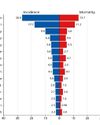
An artist's rendering of a bacterial cell engineered to produce amyloid nanofibers that incorporate particles such as quantum dots (red and green spheres) or gold nanoparticles.
Nature manufactures a Nmultitude of complex, hierarchical, multifunctional ‘living’ materials – including bone, wood, tissue, and organs. Advances in modern biotechnology over the past few decades have enabled scalable manufacturing of multiple ‘nonliving’ materials (e.g., chemicals, fuels, pharmaceuticals) produced by a variety of wildtype and engineered microorganisms. However, synthetic replication of hierarchical living materials largely eluded scientists and engineers until the advent of a new field-engineered living materials (ELMs). Scientists and engineers are always pursuing the goals to create a world of living materials that have the characteristics of biological systems: self-replication, self-regulation, self-healing, environmental responsiveness and self-sustainability. The fusion of synthetic biology with classical materials science has yielded breakthrough materials innovations and spawned a new biotechnology field. Engineered Living Materials (ELMs) are defined as engineered materials composed of living cells that form or assemble the material itself or modulate the functional performance of the material in some manner. The integration of functional synthetic materials and living biological entities has emerged as a new and powerful approach to create adaptive and functional structures with unprecedented performance and functional structures with unprecedented performance and functionalities. The proposed idea would push the boundaries and frontiers of synthetic biology, materials engineering, nanotechnology, biomaterials, artificial intelligence and directed evolution into new realms which can be summarized as:
Diese Geschichte stammt aus der March - April 2021-Ausgabe von Scientific India.
Starten Sie Ihre 7-tägige kostenlose Testversion von Magzter GOLD, um auf Tausende kuratierte Premium-Storys sowie über 8.000 Zeitschriften und Zeitungen zuzugreifen.
Bereits Abonnent ? Anmelden
Diese Geschichte stammt aus der March - April 2021-Ausgabe von Scientific India.
Starten Sie Ihre 7-tägige kostenlose Testversion von Magzter GOLD, um auf Tausende kuratierte Premium-Storys sowie über 8.000 Zeitschriften und Zeitungen zuzugreifen.
Bereits Abonnent? Anmelden

Building world's 1st pyramid
In a preprint study published this summer, researchers proposed that ancient Egyptians built the world's first pyramid the 4,700-year-old Step Pyramid of Djoser, which sits on Egypt's Saqqara plateau using a \"modern hydraulic system\" powered by a long-gone branch of the Nile River.

Climate change arms the world, ovarian cancer pulls the trigger.It's time we disarm them both
Climate change, driven by human activities, leads to environmental changes such as rising temperatures, altered weather patterns, and increased pollution.

Climate Change Added 18 mph to Hurricane Wind Speeds over Past 5 Years
High ocean temperatures caused by global warming boosted maximum intensities for most storms between 2019 and 2023, as well as for every 2024 hurricane.

How Indian Vulture Decline Led to 500,000 Deaths in 5 Years
Once a common sight across India, vultures were abundant scavengers, often seen circling landfills in search of carcasses.

Understanding Monkeypox: Insights and Implications
Monkeypox, a viral zoonotic disease, has gained significant attention in recent years due to its re-emergence and sporadic outbreaks globally.

AI predicts that most of the world will see temperatures rise to 3°C much faster than previously expected
Three leading climate scientists have combined insights from 10 global climate models and, with the help of artificial intelligence (AI), conclude that regional warming thresholds are likely to be reached faster than previously estimated.

Infrared Radiation: A New Player In Mosquito Host-Seeking
The sound of mosquitoes is all around us when the sun sets and the air gets warm and sweltering.

Fish Oil May Benefit to Cure Alzheimer's, disorder: new findings
The benefits of fish and fish oil consumption are well-known in medical science as fish is considered a precious food resource that provides sufficient nutrition to humans.

A new class of antivirals could help prevent future pandemics
The arrival of Paxlovid in December 2021 marked another turning point in the COVID-19 pandemic an effective antiviral that has since successfully treated millions.

Turning carbon emissions into methane fuel
Chemists have developed a novel way to capture and convert carbon dioxide into methane, suggesting that future gas emissions could be converted into an alternative fuel using electricity from renewable sources. Carbon dioxide (CO2) is a greenhouse gas that accounts for a large part of Earth's warming climate, and is produced by power plants, factories and various forms of transportation.